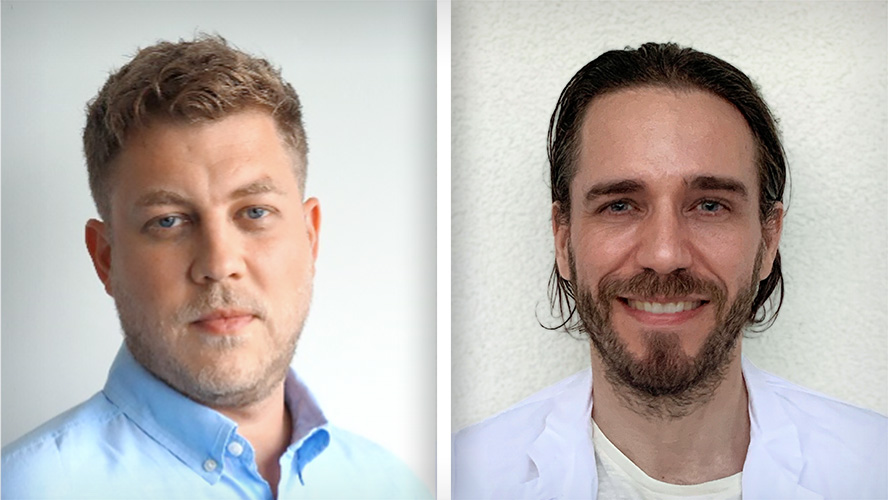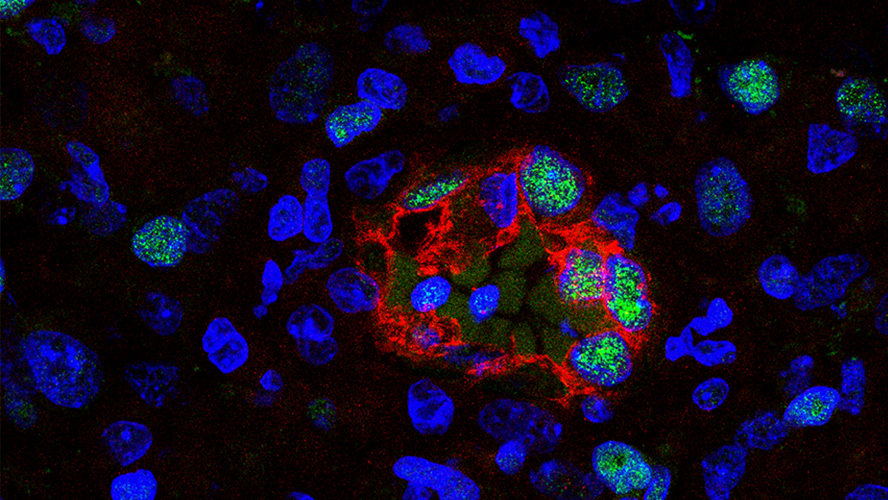
A collaborative study conducted by researchers at the Krembil Brain Institute and Neuroscience Center Zurich has revealed that the protein nucleolin acts through similar pathways to promote the growth of blood vessels in brain tumours and in the healthy brain during fetal development.
“Our findings suggest that nucleolin and related proteins could be therapeutic targets to slow or stop the growth of brain tumour vasculature and, in turn, brain tumours such as glioblastomas,” says Dr. Thomas Wälchli, a neurosurgeon-neuroscientist who led the international team of scientists. Dr. Wälchli is currently a neuroscientist at the Krembil Brain Institute and at Neuroscience Center Zurich.
Glioblastoma is an aggressive form of brain cancer. Few treatments are available, and most patients survive less than 15 months after their diagnosis. One of the key features of glioblastomas is their ability to stimulate the formation of blood vessels to supply nutrients.
“Blood vessel formation—a process called angiogenesis—is crucial for fetal brain development. The process becomes largely dormant in the healthy adult brain but can be activated in conditions such as stroke, neurodegenerative diseases, brain vascular abnormalities and brain cancer,” says Dr. Wälchli.
“Understanding how blood vessels grow during fetal brain development can help us understand how they grow in brain tumours. Accordingly, identifying proteins like nucleolin that regulate blood vessel formation in the developing brain can provide valuable insights into these conditions and reveal potential targets for new treatments.”
Using experimental models and samples of developing brain and brain tumour tissue, the research team discovered that nucleolin promotes blood vessel growth in the developing brain by stimulating the sprouting of new vessel branches and the production of endothelial cells—the cells that line the vessels. Nucleolin accomplishes this by regulating the activity of enzymes that are involved in energy consumption in endothelial cells.
The team also found that nucleolin is reactivated in blood vessels that form within brain tumours; higher levels of the protein are associated with increased energy consumption and vessel formation, and more aggressive tumours.
“Our results suggest that nucleolin contributes to tumour growth by facilitating angiogenesis through molecular pathways similar to those that are active in the healthy developing brain,” says Dr. Marc Schwab, a researcher in Dr. Wälchli’s lab.
“Inhibiting nucleolin reduced the production of blood vessel cells in the laboratory,” adds Dr. Schwab. “This finding holds promise for guiding the development of novel treatments.”
With a better understanding of the complex processes that are involved in angiogenesis, researchers could develop novel therapies for glioblastoma and other disorders that affect the brain's blood vessels.
Previous treatments that have been developed to slow or halt glioblastoma growth by inhibiting pro-angiogenic proteins have not improved survival rates. This is in part due to our limited understanding of how blood vessels develop in brain tumours.
“Nucleolin is one of a large number of proteins that contribute to blood vessel formation in the developing and diseased brain, and more research is needed to fully understand the role of each in tumour growth,” cautions Dr. Wälchli. “Nonetheless, this study sheds light on a fundamental process involved in blood vessel development and lays a solid foundation for future studies and drug development.”
This work was supported by the OPO Foundation, the Swiss Cancer Research foundation, Stiftung zur Krebsbekämpfung, the Kurt und Senta Herrmann Foundation, Forschungskredit of the University of Zurich, the Zurich Cancer League, the Theodor und Ida Herzog-Egli Foundation, the Novartis Foundation for Medical-Biological Research, the HOPE Foundation, the Swiss National Science Foundation, the European Research Council, the Commission of the European Communities, ETH Zurich and the UHN Foundation. Dr. Thomas Wälchli is a neurosurgeon-neuroscientist and currently a neuroscientist at the Krembil Brain Institute; he is also a Research Group Leader at Neuroscience Center Zurich, University Hospital Zurich and the University of Zurich. Neuroscience Center Zurich is a joint center of the University of Zurich, ETH Zurich and the University Hospitals and Clinics in Zurich.
Schwab M, de Trizio I, Ghobrial M, Shiu JY, Sürücü O, Girolamo F, Errede M, Yilmaz M, Haybaeck J, Moiraghi A, Monnier PP, Lawler SE, Greenfield JP, Radovanovic I, Frei K, Schlapbach R, Vogel V, Virgintino D, De Bock K, Wälchli T. Nucleolin promotes angiogenesis and endothelial metabolism along the oncofetal axis in the human brain vasculature. JCI Insight. 2023 Apr 24. doi: 10.1172/jci.insight.143071.
To learn more, click here for a review of brain vasculature in development and disease at single-cell resolution published in Nature Reviews Neuroscience (as featured on the journal cover), and click here for a preprint article describing the molecular atlas of the human brain vasculature across development, adulthood and disease at the single-cell level (under third revision at Nature).

Immunofluorescence image of glioblastoma cells where blood vessel endothelial cells are stained red, nucleolin is stained green and the cell nucleus is stained blue.




